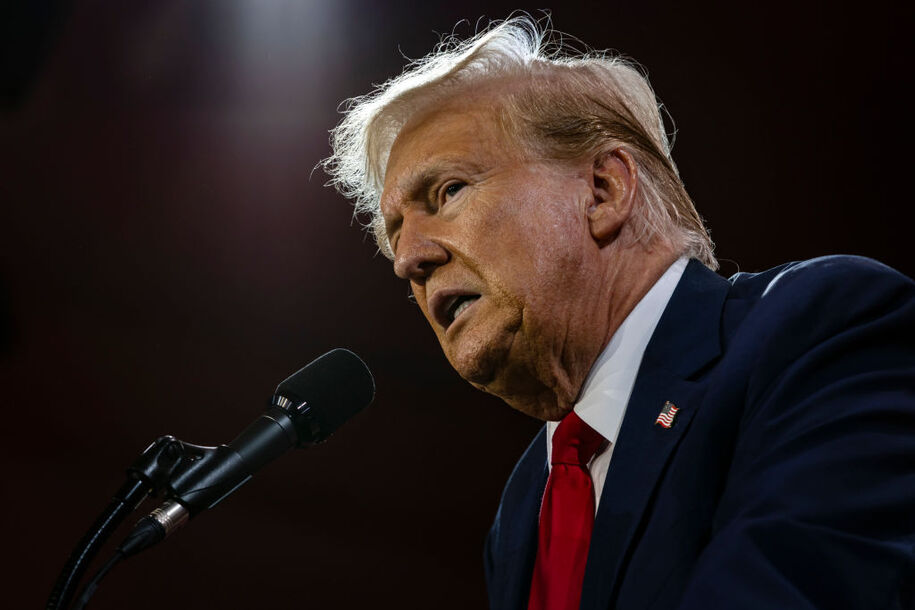
Absurdly wealthy billionaires may be breakfasting with Donald Trump and cutting him huge checks that make up for his lack of small-dollar fundraising, but the guys who run America’s largest businesses are lining up behind President Joe Biden.
According to data compiled by Jeffrey Sonnenfeld, the head of the Chief Executive Leadership Institute at Yale University, the majority of corporate CEOs are Republicans. However, the number of Fortune 100 CEOs who have cut a check for Trump is exactly zero. Trump has “the lowest level of corporate support in the history of the Republican Party,” Sonnenfeld said.
It’s not that the CEOs love everything about Biden. They would surely love to see fewer environmental regulations and lower corporate taxes. But they recognize a good thing when they see it. As Sonnenfeld wrote in The New York Times, those CEOs know that Biden delivers a more stable, robust economy than Trump—an economy that is genuinely good for their businesses.
Also, Trump simply terrifies them.
Surveys from the Yale Chief Executive Leadership Institute show that between 60% and 70% of CEOs consider themselves Republicans, according to Sonnenfeld. In the past, they haven’t hesitated to contribute to Republican candidates. In 2004, when George W. Bush ran for a second term, 42 of the CEOs contributed to his campaign.
But no Fortune 100 CEO cut a check for Trump in 2016, and only two did so in 2020. So far, in 2024, even those two haven’t signed on to his campaign.
It’s not hard to see why business leaders would be reluctant to sign onto Team Trump. Biden has delivered what may be the best economy in decades, with consistently low unemployment, record-high stock markets, and infrastructure investments that serve businesses possibly even more than individuals. They may not like how Biden calls them out for their greed, but they very much like how he is working with companies in a way that shows clear goals and consistent regulation.
A recently released study from Moody’s Analytics found that Trump’s plans for a second term are a formula for economic disaster. Mass deportations would result in an enormous worker shortage. Trump’s insistence on widespread tariffs would generate instant and sustained inflation. Moving the cost of government from income tax to tariffs would be hugely regressive, resulting in a recession almost from the first day Trump was able to implement his policies.
Trump made huge claims about his business prowess in 2016, but for all his hype, his performance was weak, even before the pandemic. Biden has actually delivered. That’s especially true of how Biden has kicked off a manufacturing boom that has already generated more jobs in this area than any president in decades.
CEOs were particularly unimpressed by how Trump attacked individual companies and executives during his campaign, according to Sonnenfeld. And they’re especially concerned by how he carried a grudge against those companies and incited his followers against them, even after moving into the White House. And now they fear that their company could become a victim of a government-led quest for “retribution.” Biden doesn’t conduct a government based on revenge. They like that.
Those executives are also in no hurry to get into Trump’s war on diversity. White nationalism may thrill Trump’s MAGA base, including Elon Musk, but many of these CEOs remember what happened in 2017, when they signed on to be part of his business council, only to resign after Trump called neo-Nazis marching in Charlottesville, Virginia, “very fine people.”
CEOs also share a concern with many others about Project 2025—the Heritage Foundation’s agenda for an intensely autocratic second Trump administration—and Trump’s plans to fill the government with incompetent ideologues. This concern comes partly because that plan calls for monetary policies that seem to have emerged from a Ron Paul newsletter. In addition to heavy tariffs, Trump wants to strip the Federal Reserve Board of its independence, force interest rates lower, and devalue the dollar—all of which would drive inflation through the roof and massively disrupt global trade.
Believe it or not, Sonnenfeld found that CEOs were comforted the last time around by the presence of advisers like Trump’s son-in-law Jared Kushner and then-Secretary of the Treasury Steven Mnuchin. Awful as they are, CEOs saw them as people who understand how business and the economy work. The MAGA extremists Trump is gathering around him this time don’t understand business. They’re more committed to radical change—more interested in destroying than improving—and that clearly doesn’t appeal to CEOs of large companies
CEOs may be dragging in far more money than they deserve. They may be failing to protect their companies by failing to stand up for employees. But, says Sonnenfeld, CEOs are “not protectionist, isolationist or xenophobic, and they believe in investing where there is the rule of law, not the law of rulers.”
Progressives and corporate CEOs don’t share a lot of beliefs about the proper role of government and how the economy should work. But when it comes to Donald Trump, everyone from the far left to the corporate right is on the same side.